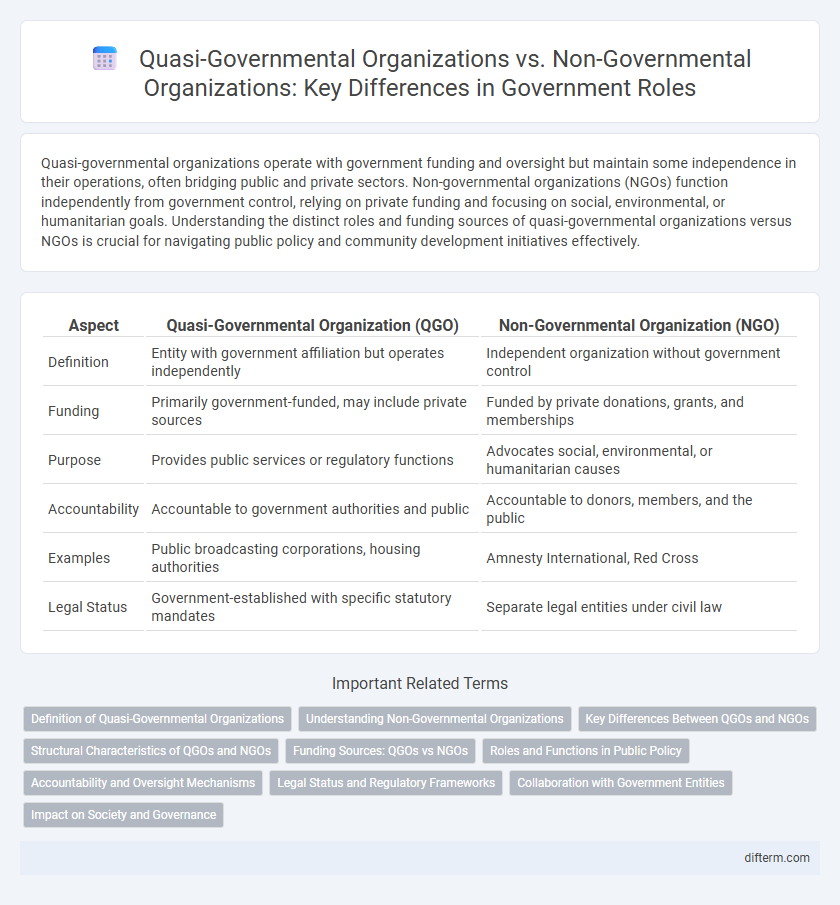Quasi-governmental organizations operate with government funding and oversight but maintain some independence in their operations, often bridging public and private sectors. Non-governmental organizations (NGOs) function independently from government control, relying on private funding and focusing on social, environmental, or humanitarian goals. Understanding the distinct roles and funding sources of quasi-governmental organizations versus NGOs is crucial for navigating public policy and community development initiatives effectively.
Table of Comparison
| Aspect | Quasi-Governmental Organization (QGO) | Non-Governmental Organization (NGO) |
|---|---|---|
| Definition | Entity with government affiliation but operates independently | Independent organization without government control |
| Funding | Primarily government-funded, may include private sources | Funded by private donations, grants, and memberships |
| Purpose | Provides public services or regulatory functions | Advocates social, environmental, or humanitarian causes |
| Accountability | Accountable to government authorities and public | Accountable to donors, members, and the public |
| Examples | Public broadcasting corporations, housing authorities | Amnesty International, Red Cross |
| Legal Status | Government-established with specific statutory mandates | Separate legal entities under civil law |
Definition of Quasi-Governmental Organizations
Quasi-governmental organizations are entities that possess both governmental authority and private sector management, often established by legislation to perform specific public functions. These organizations operate independently from direct government control but fulfill public policy objectives, such as housing authorities or public utilities. Unlike non-governmental organizations, quasi-governmental organizations have legal powers granted by the government, enabling them to levy taxes, issue bonds, or regulate certain activities.
Understanding Non-Governmental Organizations
Non-governmental organizations (NGOs) operate independently from government control, focusing on humanitarian, environmental, or social issues to promote public welfare. Unlike quasi-governmental organizations, which have some government affiliation or funding, NGOs rely primarily on private donations, grants, and volunteer efforts for their activities. Understanding NGOs involves recognizing their role as critical agents in civil society, advocating for policy changes, and delivering services often beyond the reach of governmental institutions.
Key Differences Between QGOs and NGOs
Quasi-governmental organizations (QGOs) operate with governmental authority or funding while maintaining some independence, whereas non-governmental organizations (NGOs) function independently without direct government control or funding. QGOs often focus on public policy implementation and service delivery, while NGOs typically emphasize advocacy, humanitarian aid, and grassroots initiatives. The accountability structure also differs: QGOs are accountable to government bodies, whereas NGOs answer to donors, beneficiaries, and their own governance frameworks.
Structural Characteristics of QGOs and NGOs
Quasi-governmental organizations (QGOs) typically have a hybrid structure combining governmental oversight with operational autonomy, often funded partly by government sources and governed by both public officials and private sector representatives. Non-governmental organizations (NGOs) generally possess independent governance frameworks, with structures established through private statutes or membership-based models, maintaining autonomy from direct governmental control and relying predominantly on private funding and donations. The structural distinction lies in QGOs' semi-public mandate and dual accountability, contrasting with NGOs' full independence and civil society-driven governance.
Funding Sources: QGOs vs NGOs
Quasi-governmental organizations (QGOs) primarily receive funding from government budgets, grants, and public sector contracts, providing a stable and predictable revenue stream. Non-governmental organizations (NGOs) rely heavily on private donations, membership fees, and fundraising activities, resulting in more variable and diversified funding sources. This fundamental difference in funding impacts operational autonomy, financial stability, and accountability mechanisms between QGOs and NGOs.
Roles and Functions in Public Policy
Quasi-governmental organizations operate with government backing, implementing public policies and delivering services while retaining some operational independence, often bridging gaps between government agencies and private sectors. Non-governmental organizations (NGOs) independently advocate for social, environmental, and human rights issues, influencing public policy through grassroots mobilization, research, and lobbying without formal governmental authority. Both entities shape public policy but differ in accountability and operational scope, with quasi-governmental organizations focusing on execution and NGOs emphasizing advocacy and public engagement.
Accountability and Oversight Mechanisms
Quasi-governmental organizations (quangos) often operate under government mandates, subject to stricter accountability through legislative oversight, financial audits, and regulatory compliance to ensure alignment with public policy goals. Non-governmental organizations (NGOs), while independent from direct government control, typically establish accountability mechanisms based on donor requirements, transparency standards, and ethical codes to maintain trust and legitimacy. The degree of oversight in quangos is typically formalized through government agencies and public reporting, contrasting with NGOs' reliance on voluntary disclosure, stakeholder engagement, and external evaluations.
Legal Status and Regulatory Frameworks
Quasi-governmental organizations operate under specific legal mandates granted by government entities, often enjoying partial government funding and regulatory oversight that blend public accountability with operational autonomy. Non-governmental organizations (NGOs) function independently from government control, relying primarily on private funding and adhering to nonprofit regulations without direct government intervention. The distinct legal status of quasi-governmental bodies subjects them to hybrid regulatory frameworks, while NGOs comply with civil society laws, emphasizing transparency and mission-driven governance.
Collaboration with Government Entities
Quasi-governmental organizations often collaborate closely with government entities by operating under governmental regulations and receiving public funding, enabling streamlined implementation of public policies. Non-governmental organizations maintain independence from direct government control but work collaboratively on specific projects or advocacy efforts, leveraging partnerships to influence policy and provide community services. Both entities contribute uniquely to public governance, with quasi-governmental bodies facilitating formal governmental objectives and NGOs enhancing civic engagement and social innovation.
Impact on Society and Governance
Quasi-governmental organizations blend government authority with private sector flexibility, enabling them to implement public policies efficiently while maintaining accountability in public service delivery. Non-governmental organizations operate independently from government control, often filling gaps in social services and advocating for marginalized communities, thereby influencing governance through grassroots mobilization and public awareness campaigns. Both types of organizations contribute uniquely to societal development and governance by balancing regulatory oversight and community-driven initiatives.
quasi-governmental organization vs non-governmental organization Infographic

 difterm.com
difterm.com